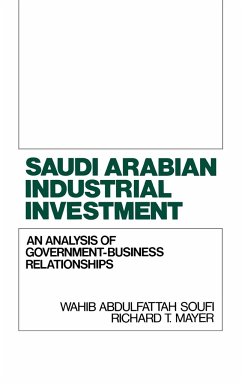The future for all the nations of the world, whether diverse- or single-commodity countries, is bound up in effective economic development. In particular, an understanding of the relationship between a government and its private business sector is becoming an increasingly important factor in the management of economic growth. This work presents the results of a study that focuses on efforts to stimulate private industrial investment in the manufacturing sector of the Saudi Arabian economy. The conclusions help to shed light on the interplay of government-business relationships not only in Saudi Arabia, but in other developing countries as well. The study, conducted in 1986, included a series of interviews with manufacturing executives, government officials, and chamber of commerce members. Wahib Soufi and Richard Mayer begin their analysis with an overview of government and business in Saudi Arabia, assessing the role played by Islamic law and the need for diversification. They follow this by sketching a conceptual framework for examining government-business relationships, and outlining issues relevant to promoting industrial development. A set of three chapters explore the results of the survey data, detailing the perceptions of the Saudi private business sector, comparing business and government perceptions, and finally, evaluating the effect of communications, expectations, and perceptions on the government-business relationship. The concluding chapter reexamines these conclusions on the basis of information available three years after the initial study, and is followed by a selective bibliography. This important study will be a valuable resource for corporate managers and government officials involved in economic planning, and a useful reference tool for college courses in business and economic policy and for public and academic libraries.
Hinweis: Dieser Artikel kann nur an eine deutsche Lieferadresse ausgeliefert werden.
Hinweis: Dieser Artikel kann nur an eine deutsche Lieferadresse ausgeliefert werden.








